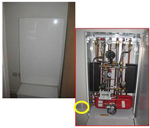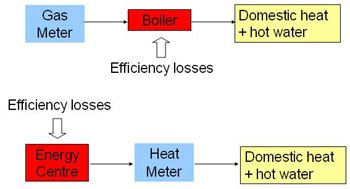- Glasgow City Council
- > More Services
- > Housing Services
- > Energy and Affordable Warmth
- > Commonwealth Games Village District Heating
- > Questions and Answers for Games Village District Heating
Questions and Answers for Games Village District Heating
What is it?
The Council has prepared the following answers to questions that you may have about being connected to district heating.
You should read these questions and answers along with the Residential Heat Supply Agreement.
What is the Heat Supply Agreement?
The Heat Supply Agreement (HSA) is the contract between the Council and you, the resident, for the supply of your heat and hot water. The HSA sets out the responsibilities of both parties.
How are my charges calculated?
As with any utility supply, your district heating bill will have a standing charge. This charge is for being connected to the distribution network and a charge based on the amount of hot water and heat that you use. You'll also have a maintenance charge - equivalent to maintaining a gas boiler.
Your charges are benchmarked and shouldn't be any more than the equivalent cost of having a modern, efficient gas boiler and using the same amount of heat and hot water.
This benchmark is calculated by taking the average cost of running and maintaining a gas boiler based on the cost of gas from four major energy suppliers and the cost of a basic gas boiler maintenance plan from these energy suppliers. Some examples for selected house types are shown at the end of these questions and answers.
Gas consumption benchmark
Why is equivalent gas consumption used to calculate the consumption charge benchmark?
The energy consumption in kWh calculated from the gas meter for a home heated by a modern, efficient gas boiler does not correspond directly to the energy consumption in kWh seen on the heat meter. This difference is caused by the gas meter recording energy before the gas boiler where at least 10% of the energy is lost in converting gas into heat and hot water.
For the district heating system, these losses occur at the Energy Centre and therefore the heat meter records the actual energy you have used to heat your home and provide hot water. This is shown on the diagram below. The equivalent gas consumption in kWh is therefore proposed to be calculated as 10% greater than the heat meter consumption in kWh when information on benchmarking is provided.
Is the cost the same if you have a Pay-As-You-Go Meter?
Yes, if you choose to manage your energy bills by opting for a Pay-As-You-Go meter, you will be charged at the same rate as residents paying via Direct Debit.
How do I report a fault?
If you have a fault with your district heating, for example a leak at the Consumer Interface Unit or do not have any hot water in your taps, please call the maintenance team, free of charge, on 0800 195 0042 (24 Hours - Games Village Only).
The maintenance team will only deal with the district heating parts - NOT your radiators, internal pipes, heating timer or PV panels. Contact details for these faults are provided in your information pack.
Will vulnerable customers receive a priority service?
Yes, if a supply failure affects a group of residents (e.g. a burst distribution pipe), any residents registered as vulnerable customers will receive priority service. However, we aim to complete all repairs within the response times outlined in Section 21.5 of your Heat Supply Agreement.
How often will you contact me?
We will contact you every three months when we issue your quarterly Charging Statement. If it looks like you are using more heat and hot water than we would expect for your house type, we will get in touch and offer energy efficiency advice.
 | The Consumer Interface Unit needs to be serviced every two years and we'll need to arrange access to your home to come and service it. A picture of the Customer or Hydraulic Interface Unit is shown below. Please note that the power switch circled in the picture must be kept ON. |
Who looks after the District Heating System?
The district heating system is currently operated and maintained on behalf of the Council by Vital Energi, the company who designed and built the system. The operation and maintenance costs, including servicing your Consumer Interface Unit, are fully covered by the benchmarked charges discussed above. The Council will notify you if the contractor arrangement changes at all.
How often will the utility supply be interrupted?
The district heating system is designed to have a back-up boiler and pump on stand-by so that supply continues even if a fault develops in the system. This also allows the plant to be serviced without interrupting the supply.
The system is also continually monitored. This will help give early warnings where a fault may be developing. This should allow any potential faults to be identified before the fault can cause an interruption to the supply.
We may occasionally need to interrupt the supply to fix a fault. The Operation and Maintenance Contractor will have a fixed number of hours where the supply can be interrupted on a planned basis in any 12 month period.
This service interruption limit will be benchmarked against other district heating systems to ensure that the supply is available for the maximum period possible.
The Operation and Maintenance Contractor will also be required to complete and scheduled maintenance that may interrupt the supply during low demand periods e.g. during the summer or overnight.
How do I provide feedback or make a complaint?
You can get in touch by:
- Completing an Online Form or
- By phoning 0141 287 0900 or
- By visiting a Council Office or
- In writing to Freepost RLYU-GKGE-JGLJ, Customer Care Team, Chief Executive's Department, Glasgow City Council, G2 9RZ.
Representatives from the council and the Operation and Maintenance Contractor will also be able to attend a residents' meeting if needed, to receive feedback and discuss any issues about the district heating system.
What are my obligations as a customer?
So that we can operate and maintain the system as efficiently as possible and keep your heat and hot water charges as low as possible, we need you to:
- Keep appointments made to maintain the heating system, where we need access to your home;
- Do not interfere or damage any part of the heating system within or outside your home; and
- Keep up to date with your payments.






